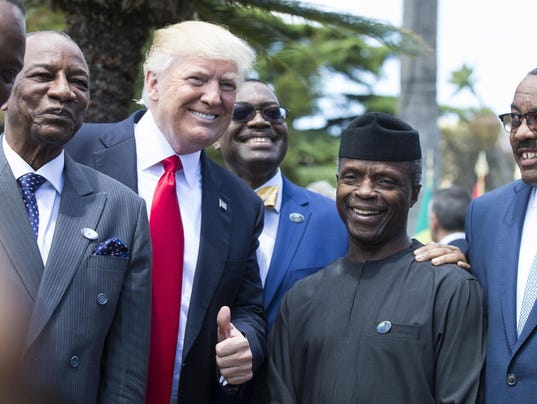
When President Trump meets with Nigerian President Muhammadu Buhari Monday, President Trump needs to seize this opportunity to call Buhari to account for allowing unchecked atrocities against Christians in his country.
While Boko Haram has made headlines for murdering and terrorizing people in Nigeria, in this case President Buhari is allowing members of his own ancestral group — the Fulani — to attack innocent communities.
The unimpeded actions of this group of extremists, loosely known as “militant Fulani herdsmen,” are creating a humanitarian crisis of shocking proportions in Nigeria.
Indeed, most people have never even heard about this brutal group, which earlier this month executed an attack that killed 19 Christians.
President Trump must not pass up a prime opportunity to fight this injustice by facing down its chief enabler. Buhari intends to speak with Trump about the promotion of economic growth, fighting terrorism, and building on Nigeria’s role as a democratic leader in the region.
But the conversation must not stop there.
Buhari’s Fulani kin are responsible for hundreds of deaths already in 2018, attacking villages and forcing thousands of people to flee their homes and land. The scale of the Fulani aggression threatens to surpass Boko Haram’s reign of terror, based on the sheer number of deaths.
Since 2001, the Africa Center for Strategic Studies estimates as many as 60,000 Nigerian lives have been lost to violence between Fulani herdsmen and farmers.
In the past year alone, Open Doors received reports from its in-country sources of at least 611 deaths in the latest spike of militant Fulani unrest. These attacks played out in more than 50 incidents, where churches and homes were burned and residents were violently murdered, raped and kidnapped.
The situation is now growing even worse, with 497 more deaths already reported to Open Doors in the first four months of 2018.
Yet, unlike Boko Haram, the ongoing and wide-sweeping violence of the militant Fulani herdsmen has gone relatively unnoticed.
There are several reasons why.
There are complex economic factors, difficulty in gleaning exhaustive data due to the rural locations, and it can be challenging to understand whether Fulani extremists are working in a coordinated fashion typical of other terrorist organizations.
Religious dynamics also make reporting on the violence complicated. There is solid reason to believe the Fulani are targeting the Christian minority. In studying previous attack sites, Open Doors found that:
- 88% of Fulani attack victims in Nigeria’s Benue State were Christians.
- 70% of victims in Taraba State were Christians.
- 75% of victims in Nasarawa State were Christians.
This systematic targeting of Christians likely stems from waves of Islamic radicalization in this region in recent decades, with the aim of creating a fully Islamic Nigeria.
Open Doors conducted local interviews, which revealed that, in addition to winning the land war, the militant Fulani’s ultimate goal is to undermine Christianity and the homeland rights of indigenous Christians.
“[Fulani militants] believe it is right for them to take those resources by force from infidels and apostates,” explains one former Open Doors’ West Africa researcher, Arne Mulders.
The Catholic bishops of Kaduna also believe militant Fulani herdsmen are trying to subjugate Christians, weaken Christian practices, and destroy the social and economic life of Christians they see as traitors to Islam. “There is a hidden agenda targeted at the Christian majority of southern Kaduna,” they said. “This jihad is well-funded, well-planned, and executed by agents of destabilization.”
Victims have told Open Doors they believe the Fulani are being helped by other forces — and that the Nigerian government is turning a blind eye to the violence. Some victims of the attacks contend weaponry used in the violence suggests external assistance, and the growing consensus is that Buhari’s government is doing little to nothing to stop the violence.
The clergy from Kafanchan in Southern Kaduna also cited instances where militants have been seemingly protected by the government.
“In most of these attacks, the military stands aloof and watches while our people are being massacred. … In the Godogodo and Pasakori attacks, for example, the military merely watched and supervised the burning of our homes,” they said. “When the youth mobilized to repel the attackers, the soldiers deliberately blocked them from entering the town.”
These claims were confirmed by eyewitness reports Open Doors gathered following the attacks.
While it might be difficult to parse all the religious and political factors in play, we cannot ignore the unmistakable maliciousness of the militant Fulani herdsmen, just as we have come to recognize Boko Haram’s signature cruelty. Governments around the world must ask why these attacks are happening, and what the Nigerian government is doing to stop it.
This is why, as an organization that has been actively supporting Christians facing persecution for more than 60 years, Open Doors calls upon President Trump to insist that President Buhari:
- Ensure all Nigerians are protected equally, regardless of ethno-religious affiliation, with timely security assistance against impending attacks, and sensible land-dispute solutions that take into account everyone’s needs.
- Take tangible steps to ensure the rule of law is applied uniformly, including through credible, transparent and impartial investigations to bring perpetrators of violence to justice.
- Expand U.S.-Nigeria coordinated efforts for law enforcement and legal training, monitoring and prevention of violence, and distribution of humanitarian assistance to forestall mass migration and help rebuild victims’ lives.
Just as with Boko Haram, the Fulani’s violence must be acknowledged in White House hallways, covered by media with depth and nuance, and confronted by the leaders of the free world, beginning with President Trump when he meets on Monday with President Buhari.
David Curry is the president and CEO of Open Doors USA.
Comments
Post a Comment